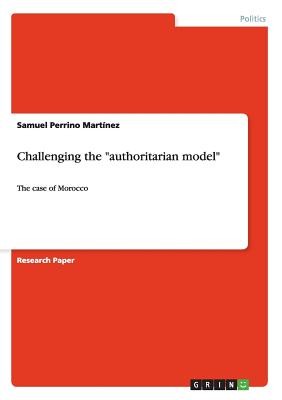
- We will send in 10–14 business days.
- Author: Samuel Perrino MartÃnez
- Publisher: GRIN Verlag
- Year: 2012
- Pages: 26
- ISBN-10: 3656283214
- ISBN-13: 9783656283218
- Format: 14.8 x 21 x 0.2 cm, minkšti viršeliai
- Language: English
- SAVE -10% with code: EXTRA
Reviews
Description
Research Paper (postgraduate) from the year 2012 in the subject Politics - International Politics - Region: Far East, University of Southern Denmark (Middle East Studies Center), course: Master, language: English, abstract: Since 1950, Morocco has received more U.S. aid than any other Arab or African country, except for Egypt. Indeed, since the beginning of the war over Western Sahara, Morocco has received more than one-fifth of all U.S. aid to the continent, totalling more than $1 billion in military assistance and $1.3 billion in economic aid ( Zunes). This aid is more relevant if one takes into account the remarkable diplomatic support given by United States, in the Sahara issue, in opposition to the International Right. For other hand, the European Union has always followed Moroccan policy, both as an Union, but also the different countries which belong to it ( especially France). This is witnessed through special status of privilege, and in different trade agreements, which some analyst have described as a "disguised subsidy" in retribution for prickly issues as immigration or terrorism ( El Mundo) Few regions have such geostrategic relevance as the Middle East, however Morocco, in opposition to their neighbours, is one of the countries with the least natural resources (Calatrava GarcÃa). It has no oil or gas, and its situation is relatively peripheral in relation to the rest of the Arab World, especially in the relation with the "hottest region" Palestine. As Frisch (2011) affirms, Moroccan regime survival is probably the hardest to explain; it is the most populous monarchy with a population of over 30 million, has no oil, a low GNP per capita by the standards of most of the states in the Middle East and North Africa, and one of the most unequal distributions of income. This paper is divided in two parts. In the first part I will expose the reasons that the Kingdom of Morocco could loose its international past relevance as a main actor in Middle East, bot
EXTRA 10 % discount with code: EXTRA
The promotion ends in 21d.09:15:26
The discount code is valid when purchasing from 10 €. Discounts do not stack.
- Author: Samuel Perrino MartÃnez
- Publisher: GRIN Verlag
- Year: 2012
- Pages: 26
- ISBN-10: 3656283214
- ISBN-13: 9783656283218
- Format: 14.8 x 21 x 0.2 cm, minkšti viršeliai
- Language: English English
Research Paper (postgraduate) from the year 2012 in the subject Politics - International Politics - Region: Far East, University of Southern Denmark (Middle East Studies Center), course: Master, language: English, abstract: Since 1950, Morocco has received more U.S. aid than any other Arab or African country, except for Egypt. Indeed, since the beginning of the war over Western Sahara, Morocco has received more than one-fifth of all U.S. aid to the continent, totalling more than $1 billion in military assistance and $1.3 billion in economic aid ( Zunes). This aid is more relevant if one takes into account the remarkable diplomatic support given by United States, in the Sahara issue, in opposition to the International Right. For other hand, the European Union has always followed Moroccan policy, both as an Union, but also the different countries which belong to it ( especially France). This is witnessed through special status of privilege, and in different trade agreements, which some analyst have described as a "disguised subsidy" in retribution for prickly issues as immigration or terrorism ( El Mundo) Few regions have such geostrategic relevance as the Middle East, however Morocco, in opposition to their neighbours, is one of the countries with the least natural resources (Calatrava GarcÃa). It has no oil or gas, and its situation is relatively peripheral in relation to the rest of the Arab World, especially in the relation with the "hottest region" Palestine. As Frisch (2011) affirms, Moroccan regime survival is probably the hardest to explain; it is the most populous monarchy with a population of over 30 million, has no oil, a low GNP per capita by the standards of most of the states in the Middle East and North Africa, and one of the most unequal distributions of income. This paper is divided in two parts. In the first part I will expose the reasons that the Kingdom of Morocco could loose its international past relevance as a main actor in Middle East, bot


Reviews